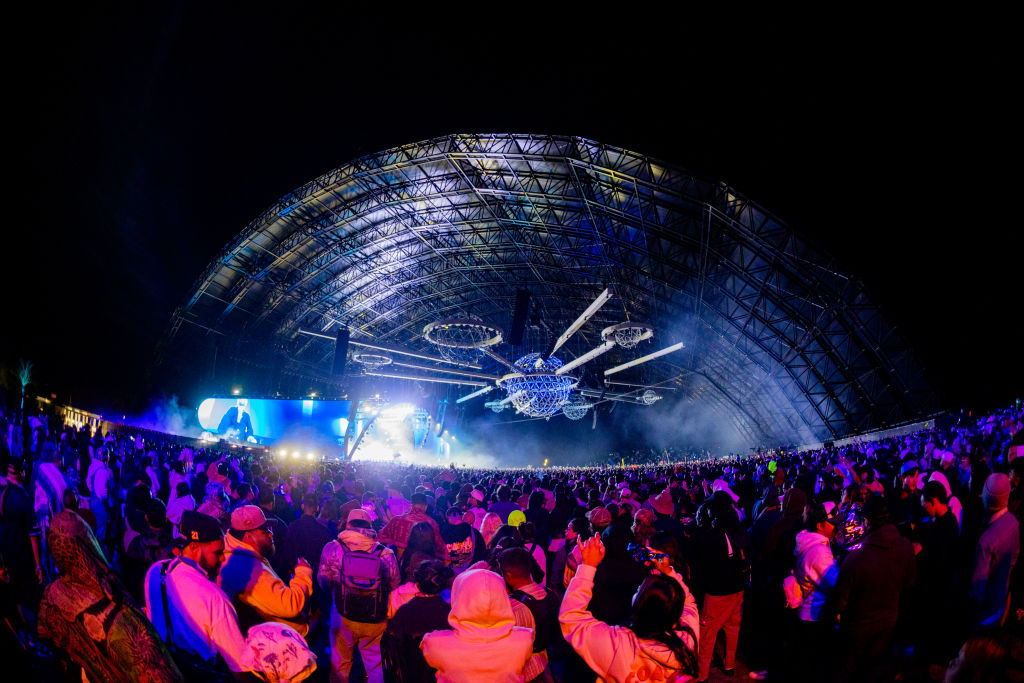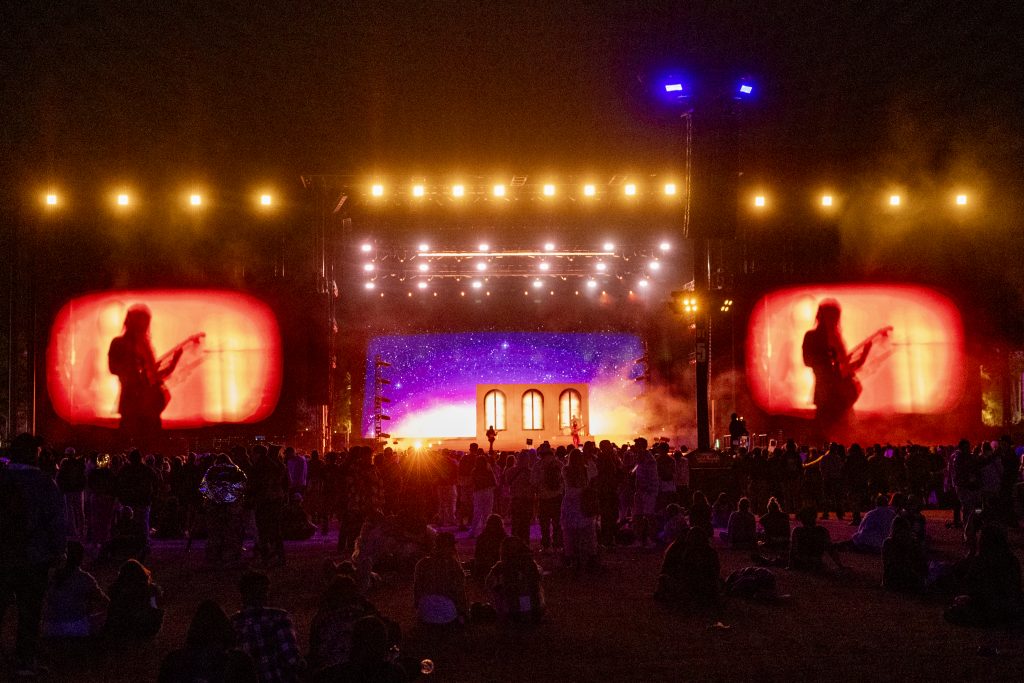Don't Stop Living While Living with Cancer
- Music and art can be so healing for survivors, but before heading off to join the masses at a large outdoor concert, event or other celebration this summer, it’s also important to consider any potential challenges you may encounter along the way.
- Consider outdoor elements like extreme heat, rain, or dust in the desert, along with potential light and sound sensitivity. There are ways to still enjoy doing what you love, but think of ways to reduce any dangers or discomfort — or at least bring some essential items.
- Even if you’re working hard to prioritize your mental health by doing activities you love, it can still be quite overwhelming to think of the things you can’t control during cancer, so acceptance is key, and being able to modify in order to fully enjoy the experience.
Music can be so healing for survivors, but before heading off to join the masses at a large outdoor concert, event or other celebration, it’s imperative to consider any potential challenges along the way, mainly, the risk of picking up COVID or other viruses when your immunity is low.
Read MoreLarger Crowds, More Risk
If you’re contemplating heading out around large crowds, it’s important to get your doctor’s approval, and be up to date on vaccines recommended by your care team.
The Centers for Disease Control and Prevention (CDC) issued the Health Alert Network (HAN) Health Advisory in December to warn healthcare providers of low vaccination rates against the flu, COVID-19, and RSV (respiratory syncytial virus) across the nation— which leaves people across the U.S. at a heightened risk of severe illness and hospitalization, and presents particular risks for immunocompromised cancer patients.
“Low vaccination rates, coupled with ongoing increases in national and international respiratory disease activity caused by multiple pathogens, including influenza viruses, SARS-CoV-2 (the virus that causes COVID-19), and RSV, could lead to more severe disease and increased healthcare capacity strain in the coming weeks,” the CDC explained.
The CDC also recommends healthcare providers “counsel patients about testing and other preventive measures, including covering coughs/sneezes, staying at home when sick, improving ventilation at home or work, and washing hands to protect themselves and others against respiratory diseases.”
When out at these functions, always have a mask or two on hand in case you find yourself shoulder to shoulder with a cluster of people. Generally, it’s best to have a bit of space around you to lower your risk. Also make sure to have hand sanitizer if you’re not able to wash your hands. As always, avoid touching your eyes to further limit the potential spread of bacteria or viruses.
Consider the Elements
For many cancer survivors, living life is the most important element, but it’s important to consider the weather elements, as people going to the Coachella Valley Music & Arts Festival in Indio, California can expect peak temperatures close to 100 degrees while out at the Empire Polo Club.
While going through certain cancer treatments, heat can be bothersome, and once you’re on festival grounds in some of the more desolate areas, it can take a very long time to get back to your hotel or campground, with many festival-goers walking thousands of miles per day.

There are less daunting concerts that be easier to navigate than fests in the middle of the desert where a lot of dust and debris will also most likely be blowing around (bandanas, masks and eye goggles/sunglasses are a must).
For example, Lollapalooza in Chicago takes place in Grant Park right on Lake Michigan, and it’s super easy to get in and out of, so you can still enjoy multiple shows per day and get the full festival experience. But if you feel like taking a break, you can head back to many surrounding hotels in minutes.
View this post on Instagram
Bottle Rock in the Napa Valley in Northern California is also a much easier experience and it caters to more of a wine crowd. The three-day event attracts around 100,000 people total, which is still significant, but not the average 125,000 people per day that Coachella welcomes every year.
Researching each fest is important! And making the trek with someone you are comfortable with.
Map Out Emergency Services, Just in Case
While you’re comparing various elements at different venues, take note of the fest’s first aid stations or emergency services areas, potential air-conditioned pop-ups and hydration stations. Just in case you may need some assistance.
Sometimes it’s worth springing for VIP if you’re able, as many more services will be available to you — like a golf cart chauffeur between stages! But with proper planning, you can make General Admission work. And the further you hang from the stage, the more room you will have to move and breathe safely around you.
Just try to get plenty of sleep and show up as healthy as possible to get the most out of your experience. Activities are a lot more fun when you’re feeling your best. It’s a top goal to have fun, but not too much fun!
If you choose to drink, depending on your health situation, moderation is always key, and hydrating between drinks. There are many alcohol alternatives these days to choose from.
RELATED: Combatting Stress During Cancer — 6 Tips to Help You Avoid Reaching for Alcohol
Never accept an open container from a stranger or take any food items (or substances) from them. It’s always best to solely rely on purchasing food and drinks directly from the venue.
Light and Noise Sensitivity
When survivors are going through treatment, or recovering from treatment, sometimes people report light and noise sensitivity, therefore that should be assessed as well in advance of planning your trip. Bringing noise-cancelling headphones or earplugs are a good idea.
Some people suffer from tinnitus as a chemotherapy side effect, and you don’t want to do more permanent damage to your hearing. It’s also possible for the lasers at night to trigger some sensitivity, which could include anxiety.

Dark sunglasses can help shield your eyes from the hot sun and reduce the intensity of the lights at night. Again, staying further away from the stages can help in these areas to help reduce any overstimulation from lighting, sound or the chatter of noise and people around you.
Beating the crowds and just enjoying the fests during the day may also be a smart option, then see how you feel and play it from there. Hopefully it is all smooth sailing, but it’s best to anticipate any possible discomfort — cancer survivor or not.
For now, HERE is some info from Variety on how to livestream Coachella weekend 2 from the comfort of your own home. And we also found the most comprehensive 2024 music festival guide provided by Thrillist.
Finding Joy While Going Through Cancer
Whether it’s a large-scale festival or an intimate acoustic night at your local restaurant, always remember to make time for things that bring you joy.
Dr. Dana Chase, a gynecologic oncologist at Arizona Oncology, emphasizes the importance of working on your emotional health during a cancer journey.
“We know from good studies that emotional health is associated with survival, meaning better quality of life is associated with better outcomes,” Dr. Chase previously told SurvivorNet.
“So working on your emotional health, your physical well-being, your social environment [and] your emotional well-being are important and can impact your survival.”
What Brings You Joy? Focus on That, Says Dr. Dana Chase
Dr. Chase recommends jotting down ten things that make you happy and making the time to do those activities throughout the day. “Sometimes I will talk to a patient about making [a] list of the top ten things that bring them joy. And trying to do those ten things to make at least 50 percent of their experiences positive throughout the day.”
Even if you’re working hard to prioritize your mental health by doing activities you love, it can still be quite overwhelming to think of the things you can’t control during a cancer battle.
Learn to Accept Yourself — A Huge Part of Living with Cancer
Dr. William Breitbart, chair of the department of psychology and behavioral sciences at Memorial Sloan Kettering Cancer Center, says acceptance is an important part of living with cancer.
“What the task becomes is having the courage to live in the face of uncertainty, realizing that you cannot necessarily control the uncertainty in life, the suffering that occurs, limitations, challenges both good and bad,” Dr. Breitbart said. “You may not be able to control those but you have control over how you choose to respond to them and the attitudes you take towards them.”
Learn more about SurvivorNet's rigorous medical review process.

